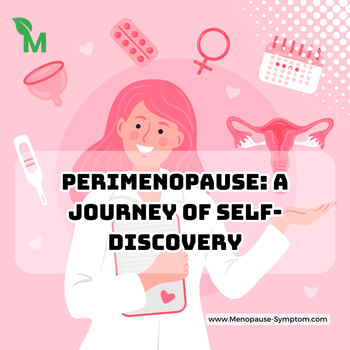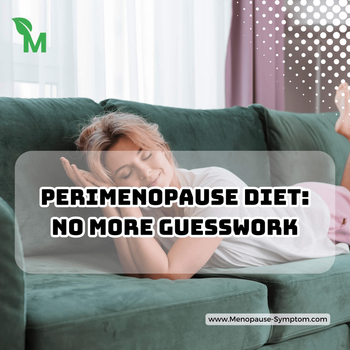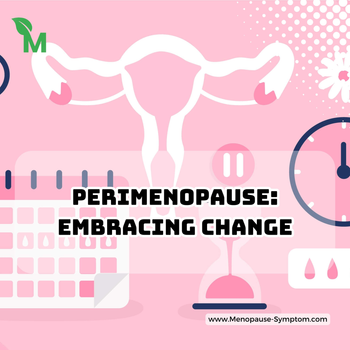To limit these symptoms and create comfort for the body, the perimenopause diet plays an important role.
Understanding Perimenopause and Menopause
Perimenopause usually begins in the 40s, but can appear earlier or later depending on each person's body. This stage lasts from 2 to 5 years until menopause officially occurs. During this time, women's bodies will experience many changes in estrogen levels, causing them to feel stressed, anxious, and have sleep problems.
The progression of perimenopause can cause many symptoms such as irregular periods, hot flashes, mood swings, and even headaches. It is important to learn and have knowledge about perimenopause, so that you will find suitable methods to take good care of your health during this period. This article will mention one of the important methods - that is diet. It is a key factor to help improve your health from the inside during this period.
Benefits of a Healthy Diet During Perimenopause
· Reduce Stress: Mental and emotional pressure during perimenopause can increase the risk of stress. A reasonable diet can help reduce this stress. Foods such as salmon, chia seeds, and walnuts contain omega-3 which have a positive effect on mood and mental health.
· Hormone Stabilizer: Foods rich in phytoestrogens such as soy, beans, and flaxseeds can help balance hormones. This is helpful in reducing the unpleasant symptoms of perimenopause.
· Boost Energy: During perimenopause, many women feel tired. Eating a nutritious diet and foods rich in fiber such as fruits, vegetables, and whole grains can provide sustained energy for the body.
· Improve Sleep: Difficulty sleeping is also a common problem during perimenopause. Foods such as milk, bananas, and sunflower seeds contain magnesium and tryptophan, which help regulate sleep.
· Support Bone Health: The decline in estrogen during perimenopause can lead to osteoporosis. To support bone health, get calcium and vitamin D from foods such as milk, cheese, and fish.
Some Foods to Include in the Premenopausal Diet
· Soybeans: Rich in phytoestrogens, soybeans help balance hormones and reduce hot flashes. Should be used in the form of soy milk, tofu or bean dishes.
· Fresh Fruits: Supplement with a variety of fruits such as apples, bananas, avocados, and strawberries. They are not only rich in vitamins but also have strong antioxidant properties.
· Green Vegetables: Green vegetables such as spinach and broccoli provide a lot of vitamin K and minerals that have a positive effect on the skeletal system.
· Whole Grains: Whole wheat bread and brown rice not only provide energy but also reduce cravings, keeping weight stable.
· Fish and Seafood: Rich in omega-3, salmon and other seafood contribute to improving mental health and cardiovascular health.
· Nuts and Dried Fruits: Chia seeds, almonds, and walnuts have the effect of reducing stress, enhancing memory and improving mood.
Things to Avoid During Perimenopause
· Caffeinated Drinks: Caffeine can increase feelings of anxiety and difficulty sleeping. Limiting caffeinated coffee and tea is essential.
· High Sugar Foods: Sugar increases cravings and consuming large amounts of sugar can contribute to weight gain, causing blood sugar problems later on. Sugar should be kept to a minimum. Especially in today's society, there are too many delicious drinks with lots of sugar such as coke, milk tea.
· Processed Foods: Stay away from processed foods, greasy foods, fast foods because they often contain a lot of preservatives.
· Alcohol: Consuming too much alcohol is never good for your body, especially during perimenopause. Alcohol can increase feelings of hot flashes and anxiety, affect sleep quality, and cause insomnia. Drinking too much alcohol during this time will cause your health to decline very quickly.
· Salt: Consuming salt in moderation will provide your body with enough iodine. Avoid consuming too much salt, as it can lead to water retention and high blood pressure. Other natural seasonings can be used instead. Some heart-healthy salt substitutes include: black pepper, garlic, dill, lemon juice, lemon zest, nutritional yeast, onion powder (or dried onion), balsamic vinegar, and truffle oil.
Conclusion: The Key to Perimenopause
Perimenopause is an important stage in a woman's life, and a reasonable diet can help ease the difficulties and improve overall health. Combining healthy foods with an active lifestyle will bring many benefits to the body. It is necessary to listen to your body and adjust your diet accordingly, not only to overcome perimenopause easily but also to create a solid foundation for health during menopause and postmenopause.
Think of the perimenopause diet as a journey to discover the good things for yourself, helping you enjoy life more fully, reduce stress, and feel healthy every day. By taking care of yourself from the inside, you will be ready to welcome the changes in your body with a more positive and confident mindset.
Source: Team MPS compiled, analyzed and wrote. Please dont reup without source. Many thanks.

Perimenopause: A Journey Of Self-Discovery
09.02.2024
Perimenopause is not just a biological stage in a woman's life, but also a meaningful journey that helps us become more aware of ourselves.

Perimenopause Diet: No More Guesswork
09.02.2024
Perimenopause is a natural process in every woman's life, usually starting in her 40s and lasting until menopause.

Perimenopause: Embracing Change
09.02.2024
Perimenopause is a natural transition in a woman's life, usually starting in her 40s or even earlier, depending on each person's body.
